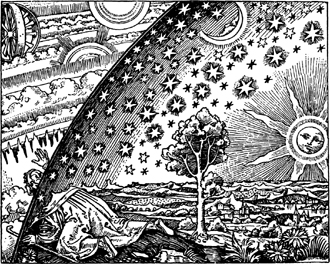
The mytho-astronomy of Hamlet’s Mill advances the challenging concept of the sky as another kind of compost; “the sky was an exacting teacher and the order of the stars an ancient gnosis” (McCord, Gnomonology). In Kenneth Irby’s view, “man matured as a creature of ice.” We see at the end of his poem “Delius” a new crisis, need of a new vocabulary (to absorb the deglaciation? agricultural urbanization? pastoral nomadism? the passing of Virgo in 10,080 B.C. or Taurus in 1800 B.C.?) The sights are set not on the mound underfoot, but on that starry horizon the alchemist beholds in the famous engraving, as he plunges through the sublunar curtain of material generation to gape at the wide open universe.*

For Olson, also, the human is a creature of ice, albeit not glacial but figurative—a disorienting blankness forcing one to take bearings.
Looking at a Nation herself untaken since before this Harbor
of her Eastward Pointing Cape was tight in ice
and measurements and lines were dropped through ice as far
to the West of South as 207°, Ten Pound Island Ledge
if I twist West I curl into the tightest Rose, if right
into the Color of the East, and North and South are
then the Sun’s half-handling of the Earth. These aspects,
annular-Eternal—the tightest Rose is the World, the Vision
is the Face of God—in this aspect the Nation
turns now to its Perfection. Its furthest or its highest
Point, its Limit now reached, the Imagination of it
here or anywhere men in duress or need in thought which taken
is belief, go on the frozen being and do take the marks and bearings.
If it seems precarious to be standing on ice to take bearings, rather than on dry land, Robinson Jeffers had insisted on an even more severe precariousness:
When the ancient wisdom is folded like a wine-stained cloth and laid up in darkness.
And the old symbols forgotten, in the glory of that your hawk’s dream
Remember that the life of mankind is like the life of a man, a flutter from darkness to darkness
Across the bright hair of a fire, so much of the ancient
Knowledge will not be annulled.
For Jeffers, the old lore was burnished in the veins, genetically knitted into the chemical residuum that later compelled Robert Duncan to insist that even holocaust and conflagration do not erase the fabric of life’s matter.
The cosmos will not
dissolve its orders at man’s evil.
“That which is corrupted is corrupted with reference to
itself but not destroyed with reference to the universe;
for it is either air or water”
Chemistry having its equations
beyond our range of inequation.
~
The tides are in our veins, we still mirror the stars, life is your child, but there is in me
Older and harder than life and more impartial, the eye that watched before there was an ocean.
That watched you fill your beds out of the condensation of thin vapor and watched you change them,
That saw you soft and violent wear your boundaries down, eat rock, shift places with the continents.
Mother, though my song’s measure is like your surfbeat’s ancient rhythm I never learned it of you.
Before there was any water there were tides of fire, both our tones flow from the older fountain.
Complementing Clayton Eshleman’s theory of “therioexpulsion”—by which humans ejected their animal past—the industrial revolution launched another “boundary catastrophe,” a geoexpulsion of the elements (preserved in traditional psychology in the humours) and reduction of all materiality to use-value. Consequently, allegiance to the planet, to the very notion of world or earth (let alone cosmos) strikes moderns as archaic, an ancient superstition.* Still, certain American poets persist in cultivating the ancient superstition of the earth, reckoning not only the intactness of a unique habitable planet but its place in a field of planets, as if there were
some part of us always
out beyond ourselves
knowing knowing knowing
Are we all in training for something we don’t name?
to exact reparation for things
done long ago to us and to those who did not
survive what was done to them whom we ought to honor
with grief with fury with action
On a pure night on a night when pollution
seems absurdity when the undamaged planet seems to turn
like a bowl of crystal in black ether
they are the piece of us that lies out there
knowing knowing knowing.